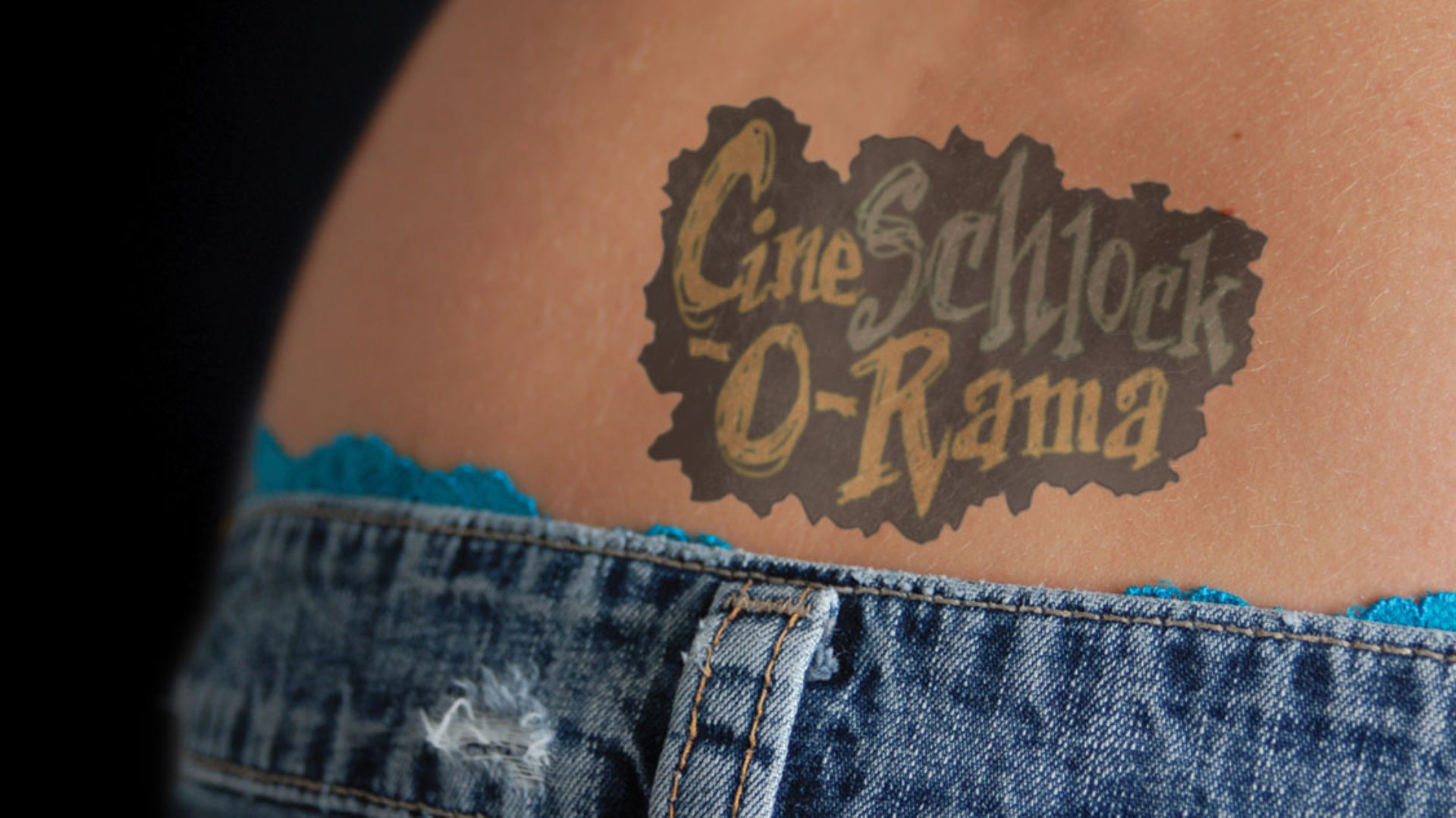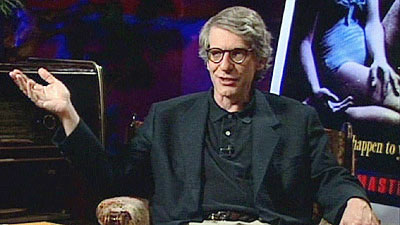
‘Rabid’ Recollections
May 10, 2004
In 1976, David Cronenberg was sweating bedroom troubles. Namely whether his producer-picked leading lady, porn siren Marilyn Chambers, could perform outside of one! Turns out she could and his sophomore feature, Rabid, remains an early testament to the filmmaker’s potent, visceral flair that boasts both cult and critical acclaim. In this exclusive interview, Cronenberg ponders the primordial power of horror, why bloodsucking is so sexy and kindly indulges the off-topic meanderings of a certain Fly fan …
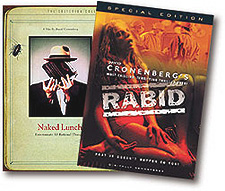
You’ve had a pretty good run recently with DVDs. Especially, the Criterion release of Naked Lunch and now this appropriate ode to Rabid. Please, please, please tell me The Fly is next.
Fox once phoned wanting me to do a commentary for The Fly. I said, “Sure, as long as I get to oversee the transfer.” It’s never looked right except in theaters. Once it hit TV and so on, it was always too bright. They said, “No, we won’t do that.” [Laughs.] And I said, “Then I’m not doing the commentary.” There won’t be a good DVD until Fox, or whoever they delegate it to, is willing to let me oversee that transfer, which as you might expect is an important thing for the fans and for me since, as I say, it’s never been seen in homes the way it’s supposed to look — ever.
I’ve heard that there are rumors of a Halloween special edition or whatever. I don’t know why Fox wouldn’t do it. I mean the amount of money involved is very minimal these days. These transfers can be done in Toronto and they can be done in Los Angeles. Mark Irwin, who shot The Fly, lives in L.A., so I just can’t understand their attitude. They just didn’t want to bother. So, I would say, unless you see an edition of The Fly that has a commentary by me and says “Director Approved,” or something like that, then it’s just not going to be a good one.
Accept no substitute! I’m a huge Fly fan, so hopefully you’ll grant me a little leeway later. But first, an intriguing point touched on in your Rabid commentary is how you find horror to be a “freeing” genre. Can you expound on that?
Yes, in a way, you’re protected by the genre, because people’s expectations are different. Their understanding and approach to what they’re watching is quite different when they know they’re watching a horror or sci-fi film. Material that would be very difficult to do — to finance and get an audience for — if it were just a mainstream, straight, realistic drama is very doable within the protective confines of horror. And I use The Fly, your favorite film [Laughs.], as an example. If you look at it just as a drama, it’s about two very attractive, eccentric people who meet and fall in love. One of them contracts a hideous wasting disease and his lover watches helplessly until she helps him commit suicide. That’s basically the plot of The Fly when it’s stripped of its horror/sci-fi elements. That’s a very tough sell!
It would be a very hard movie to watch, emotionally and so on, but because of the other things that are going on in it, you can tell that story with all the emotion you want, but it’s still somehow absorbable. There’s a sort of distancing effect. There’s a fantasy element. And it’s always very interesting to me that people who love The Fly, often, it’s because of the love story and not because of the mechanics of it. It obviously touches people, but it’s bearable. That would be a very tough story to sell in a realistic way. So, within a genre, you can experiment with fantasy, reality and emotion in a way that perhaps would be difficult or impossible to do outside the genre.
Why don’t more filmmakers recognize this? Horror is sort of a dirty word. They’re more comfortable with “supernatural thriller” or any other term.
I think it’s basically because of a certain fastidiousness. Horror involves bodies and death. It involves fluids. It’s very primal in its dealings with drama. That is its attraction for me. Philosophically, the body is the first fact of human existence. We are physical. We are corporeal. That’s why I don’t do supernatural stuff. There’s a psychological reality to that, but not a literal reality. I don’t really believe in ghosts, souls that exist outside bodies or an afterlife. I’d suppose you’d say I’m an existentialist. On the other hand, I do understand the concept of being haunted. You can be haunted by your memories of someone who’s dead and it feels quite real.
Horror is very bodily and physical. There are a lot of directors who are overrefined and just don’t want to deal with that kind of stuff. Because it is very potent, frankly, I think they have a kind of repulsion or revulsion or fear of it themselves. And, of course, like any genre, there are terrible movies made in the horror genre. That’s true of everything. I don’t really see that as being a disadvantage. There are very, very respected directors throughout history who have worked within the genre. Bergman for one. And Carl Dreyer. There are classics of silent cinema that are absolutely horror films. The Cabinet of Dr. Caligari. Nosferatu. So not every serious director has avoided the genre, but a lot of them do. I think it has to do with where the power is generated within the horror genre.
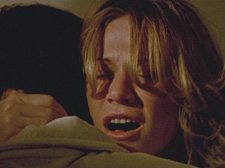 In Rabid, Rose’s vampire-like “feeding” is generally very sensual. Why is the sensualization of violence such a sticking point for society?
In Rabid, Rose’s vampire-like “feeding” is generally very sensual. Why is the sensualization of violence such a sticking point for society?
Because there is a very sensual element to violence. First of all, there’s a sensory element, which is obvious, because physical contact is being made. When you watch those nature shows and see the lion attacking the zebra and then killing and eating it. It licks the haunches of the zebra with this great sensuality, love and affection. There is a primordial sensuality involved in eating, in killing, that comes from that basic level. Of course, there’s not much in the mechanized version that humans have developed. I wouldn’t want to talk about the sensuality of war, particularly. But when it’s sort of a very personal thing you can see why — when animals kill other animals for food — there is real pleasure. There’s a visceral pleasure and exhilaration and excitement involved in that. It’s very positive for the animal that’s doing the killing, obviously. To the extent that horror films do tap into the primordial aspects of human nature, it’s perhaps inevitable that would be uncovered there.
That’s why you almost always see vampire movies depicting bloodsucking as sexual, as erotic. That’s the primordial connection. Which for civilization, is something to be repressed or something to be disguised, but it’s definitely there. People certainly talk about the sensuality of eating and food. But they don’t want to talk about, in a more primitive society, what would have to predate that, which would be the finding and killing of the food.
Your first thought for the role of Rose was Sissy Spacek, yet Marilyn Chambers is very seductive in a girl-next-door kind of way. Do you think Spacek would’ve been that same sort of character?
I understand Chambers had a rather formidable shadow on set?
Absolutely. She’s terrific in the film. You have a real ease with ambiguity in your films. Do you ever face resistance to that by outside forces?
Once again, when you’re working within the genre, it’s something that’s accepted. The ending of Rabid is pretty brutal. Let’s face it. The heroine is not only dead, but she’s disposed of in a garbage truck. [Laughs.] That’s not a typical Hollywood ending! But it’s acceptable in a horror film because you’re dealing with the darkness. You’re dealing with mortality.
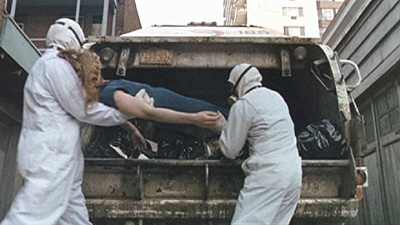
But, yeah, it’s easy to evade. Say with Dead Ringers where you have both protagonists die at the end, I had people say, “Can’t one of them live?” [Laughs.] I said, “No!” [Laughs.] “The whole point of it is that they should both die!” And so I didn’t get to make the movie for some years because of the extreme lengths to which the film was going. I wouldn’t call that ambiguity, exactly. That was just perceived as an unbearably downbeat, depressing ending.
On the other hand, it depends on who you’re making the film with. That’s really the answer. That’s why I’ve never, to this point, done a “studio” movie per se. So if I’m doing Spider, also ambiguous and downbeat, but I’m working with people who love and understand the project, at that point, there’s really no debate about what the movie should feel like. However, when it comes time to find a distributor for it, you often find problems there. By that time the movie’s made. It’s a question of marketing at that point.
Rabid begins at sort of a plastic-surgery Club Med, almost 30 years later, we have plastic-surgery game shows. Do you think we’ll ever be satisfied?
Your Fly and John Carpenter’s Thing remakes are universally praised. Why choose to remake a film?
I was very skeptical when it was proposed to me. But what I loved was the rethinking of the blending of man and fly. I really liked the way that was conceived and depicted. Although I did some serious rewriting on the script. I think, basically, the characters and dialogue are mine as well as the concept of mixing DNA, which was not understood at the time the original was made. That made it substantially different in a way that intrigued me. Also the willingness of [producer] Mel Brooks to let me run where I wanted to with that concept and not worry about how close to the original movie this one was. I wasn’t going to do the spider and fly thing. People also suggested casting Vincent Price in a small role and I said, “No, you don’t understand, as much as I have great affection for him in the original, that would completely kill this movie!” [Laughs.] “It’s just not what my project is.”
Thankfully, Mel was willing — more than willing — he encouraged me to be very extreme in my approach to the material, because he connected to that small plot that I just talked to you about. That very stressing, domestic drama. It really is a meditation on aging and death. You could also talk about disease and AIDS as well. In each case, it’s basically the same thing. What happens to the Jeff Goldblum character is a compressed version of aging. That’s why I did it. Because those possibilities were open to me.
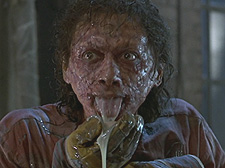 How did you arrive at Goldblum? Was it the eyes?
How did you arrive at Goldblum? Was it the eyes?
There’s a bit of your dialogue that’s always stuck with me. Is “Cheeseburger!” really the magic word to woo women, because it’s not working for me.
Ah, maybe that’s the missing element. I have a bit of a confession to make, and I hope you’ll forgive me, but I also love the sequel. How did you feel about it? Was it a painful thing?
Is it galling that the sequel, rather than your commentary, is on the current DVD?
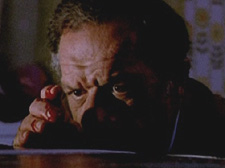 Between Shivers and Rabid you reuse Joe Silver. How important are strong character actors?
Between Shivers and Rabid you reuse Joe Silver. How important are strong character actors?
First of all, Joe was a wonderful actor and I’d seen him in The Apprenticeship of Duddy Kravitz, which has become sort of a Canadian classic film. I don’t think there are any throwaway roles in a movie. There’s no role that you can safely say, “Oh, it doesn’t matter who we get for that.” Just somebody to stand up and say the lines. If you’re serious about quality in a movie, as I was even then, one of the things you can do even with fairly limited resources is get really good actors. Even if they’re not famous or expensive actors.
The other thing, as a director, you want allies on the set. You want strength and the better the actors are — all other things being equal — the easier it is on you. Because you don’t have to coach them. When you’re working with inexperienced actors, there’s a lot of work you have to do. With Rabid, I wasn’t sure what the experience on the set would be like with Marilyn, because she was a very inexperienced actress in terms of “real” acting — with dialogue and so on. As it turned out, she was easy to work with and it was as though she’d been a professional dramatic actress all her life. But I didn’t know that.
You work with absolutely the best, most experienced actors you can in a circumstance like that. You make sure every role is given really serious attention. Joe was a terrific guy, a wonderful presence and a great character actor, so I said, “Why not use him again if he wants to do the role?” It’s also very interesting to use the same actor in a role that’s different. He was certainly more than capable of that.
You credit producers John Dunning and Ivan Reitman for guiding you through Rabid. Was there any one thing you learned from either man?
Excellent. I really appreciate your time and I look forward to sharing this with my readers, who I’m sure will enjoy the DVD because it’s very well presented and a great tribute to the film.

